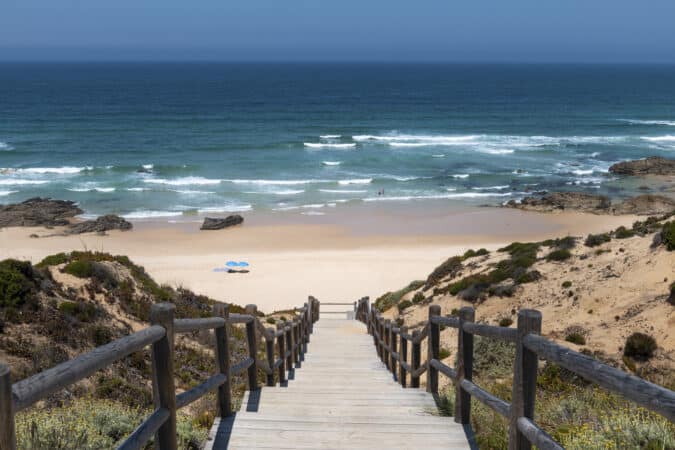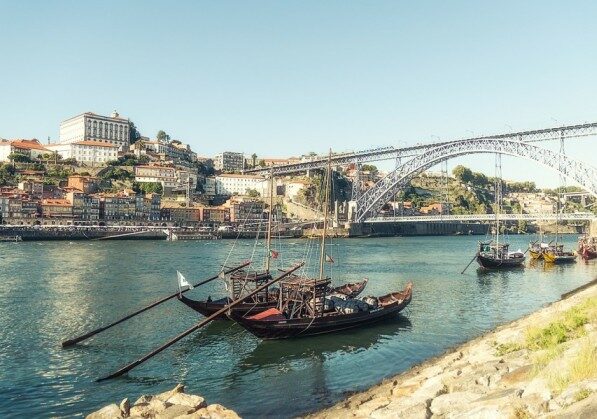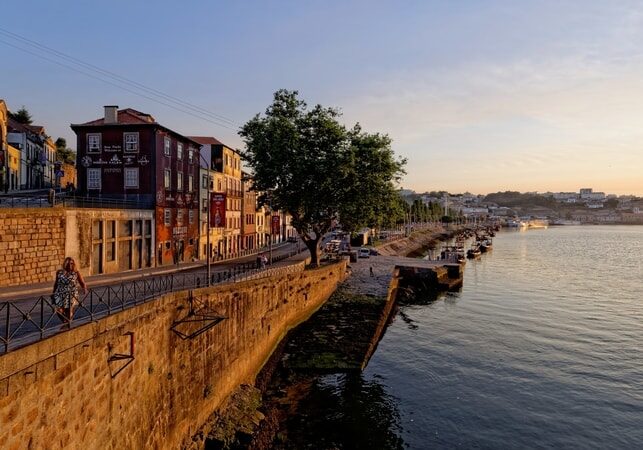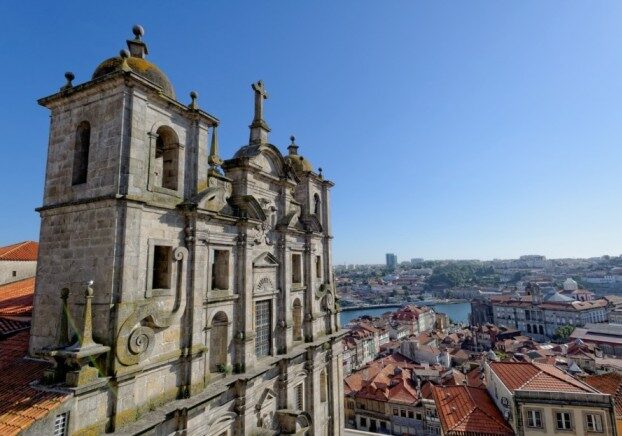Updated: July 9, 2025
Porto is one of the most charming cities in Europe. Perhaps once overlooked by Lisbon, the capital of Portugal, Porto has moved firmly into the spotlight.
Now regarded as one of the best cities to live and work in right now, thanks to its blossoming tech scene and high quality of life, Porto has a lot to offer.
In this complete guide to living in Porto, we will share a detailed overview of living in Porto, drawing on the experience of expats who love the city. If you’re thinking of starting a new life in Porto, this one is for you.
Living in Porto: Cheat Sheet
- Location: Northern Portugal, along the Douro River
- Population: About 215,000 in the city
- Known for: Port wine, historic Ribeira district, stunning bridges, and azulejos (ceramic tiles)
- Great for: Expats who want city amenities with a modern, creative vibe
- Weather: Mediterranean climate – mild, rainy winters and warm, dry summers
- Airport: Francisco Sá Carneiro Airport (OPO), about 20 minutes from the city center
- Cost of Living: Generally lower than Lisbon. Great value for food, housing, and transport.
- Best neighborhoods: Campanhã, Foz do Douro, and Boavista
- Visas: D7, D8, or Portugal Golden Visa
- Transport: Metro, trams, buses, trains, with easy access around the city and to Lisbon, Braga, and the Douro Valley
- Schools: Four international schools in Porto and surrounding areas
Why live in Porto?
When moving to Portugal, Porto is often the underdog to Lisbon and the Algarve. However, those who have given Porto a try will know just how special it is. Living in Porto provides a blend of historical charm and modern comforts, and it is more affordable than Lisbon and many other European cities.
The locals are as welcoming as you can get, with English widely spoken, and the city offers a thriving expat community, too. Porto is bathed in rich culture and history, with charming streets and colorful tiled buildings.
Even though the city has preserved its deep history, Porto is still incredibly modern, with a buzzing tech scene, great amenities for digital nomads, and an international airport for easy travel.
Add to that the mild weather, excellent public transport, an impossibly delicious food scene, and tons to do all year round, and you’ll begin to see why living in Porto is a fantastic idea.
Cost of Living in Porto
The cost of living in Porto is significantly lower than in Lisbon and many other European cities. According to Numbeo, the cost of living in Porto is over 43 percent cheaper than living in London in the UK.
While your personal spending habits and lifestyle will play the biggest role in how much money you will need per month while living in Porto, the costs below will give you an idea of the basics.
Food costs in Porto
Daily essentials can be bought on a low budget, and eating out is also at a relatively affordable cost, with an average inexpensive meal at a restaurant costing around €10 and a cappuccino costing around €2.
The table below gives an overview of the prices of food basics:
Food item | Price (€) |
Milk (1 liter) | 0.93 |
Bread (500g) | 1.34 |
Rice (1kg) | 1.34 |
Eggs (12) | 2.73 |
Chicken (1kg) | 6.73 |
Apples (1kg) | 1.89 |
Water (1.5 liters) | 0.63 |
Other living costs
Apart from groceries, your other living expenses in Porto would be:
- Utilities: €117 per month on gas, electricity, water, and waste disposal (based on an 85 square meter apartment in Porto)
- Transport: €2.00 for a one-way metro ticket, but if you buy the Porto Card or Andante Tour card, you can use the metro as much as you like
- Fuel: €1.73 per liter
- Gym membership: €38 per month
- Internet: €38 per month for unlimited data (60 Mbps or more)
- Mobile phone: €20 for a monthly plan
- Private health insurance: €30-€40 per month
The 6 Best Neighborhoods to Live in Porto
Porto has many beautiful neighborhoods and, depending on your preferences, there is something for everyone.
There are plenty of properties with stunning views, beautiful architecture, and a unique charm. Here are some of the best neighborhood options to consider:
Foz do Douro
This affluent municipality of Porto doesn’t just boast some of the best beaches, such as Praia da Luz, but also offers some great architecture and excellent restaurants, that serve traditional and international cuisine.
Riberia
If you want to live in a historic neighborhood with the stamp of UNESCO World Heritage approval, Ribera is the place to choose. Close to the Douro River, its cobbled streets, colorful houses, and lively cultural and gastronomic scene make it a treasure trove for locals and expats in Porto, Portugal.
Boavista
This modern neighborhood is the home to bustling restaurants and rooftop bars and also features Porto’s longest avenue, Avenida da Boavista. In this less touristy quarter with lots of green spaces, you can also find botanical gardens, a concert hall, and a synagogue.
Campanhã
A small parish in Porto, Campanhã is home to the important Campanhã train station, which is the hub of Porto’s railway and metro transport system. It provides an essential connection for Porto’s commuters, and its historic building dates back to the 19th century.
Downtown Porto
Downtown Porto is small, compact, and beautiful, and you can get anywhere within a 5 km radius. It is home to the stunning São Bento Railway Station with iconic blue tiles. The 20th-century building is now a National Monument of Portugal. What better way to start a daily commute than in this historic building?
Avenida dos Aliados
Avenida dos Aliados, historically named after the treaty between Portugal and the UK, is located in the city center of Porto. With historic and impressive buildings, this part of Porto is a dream location for those who appreciate exquisite architecture and elaborate façades.
Check out our article on the best neighborhoods in Porto for more options and a closer look at each neighborhood.
Living in Porto: How to Find Accommodation
One of the biggest perks about living in Porto, Portugal, is that it is easy for expats to buy or rent a home. There are no restrictions or extra hoops to jump through and with the guidance of a local property expert—like Goldcrest, who knows the market inside out—you can find your ideal home in no time.
Buying a house in Porto
House prices have remained relatively low in Porto compared to other European cities and Lisbon, although prices have been increasing in recent years.
In 2024, the average asking price for property in Porto was €4,883 in the city of Porto and €3,937 in the Porto Metropolitan Area, highlighting that it is more affordable to buy a little outside the city. You will also find stunning luxury real estate in Porto, Portugal, such as in Foz do Douro and Ribeira.
Renting a home in Porto
Although there are no restrictions on expats renting homes in Portugal, renting apartments in popular tourist destinations can be challenging because landlords prefer to rent out spaces to tourists. However, good deals are not impossible to find. The average rent for a one-bedroom apartment in Porto’s city center averages €1,032 per month.
If you’re unsure about which neighborhood you would like to live in, renting in Porto can be a good short-term solution. However, with ever-increasing rental prices, it’s a better financial move to buy a property sooner if you’re planning to live in Porto for a long time.
24 Hours in Porto: Things To Do, See, and Eat

Life in Porto, Portugal, has something for everyone. The list below is not exhaustive but provides a snapshot of what you can do while living in Porto as an expat. Pick two or three of these options for a fun-filled day in the city, and save the rest for later
- Visit Livraria Lello: Often ranked among the most beautiful bookstores in the world, this neo-Gothic gem is said to have inspired parts of the Harry Potter series.
- Experience the Clérigos Tower: Climb the 225 steps to the top for panoramic views of the city and the Douro River.
- Visit São Bento Train Station: See the breathtaking azulejo tile panels that depict scenes from Portugal’s rich history.
- Walk across Dom Luis Bridge: This double-deck iron bridge is one of Porto’s most recognizable landmarks and offers incredible photo ops, especially at sunset.
- Visit the inspiring art galleries: Galeria Fernando Santos houses the works of well-known and famous artists, and Kubik Gallery exhibits new artists and some new and daring inventions.
- See Casa da Música: Porto’s modern concert hall is an impressive piece of architecture inside and out. It is made of white-washed stone, but its interior boasts nine floors with stunning designs.
- Sip wine in Vila Nova de Gaia: Vila Nova de Gaia is central to port wine production and home to many port wine cellars.
- Indulge in Porto’s fine dining scene: The Yeatman restaurant boasts two Michelin stars and stunning views over the city. This restaurant serves beautifully crafted Portuguese dishes. Another must-try is Casa de Chá da Boa Nova, also boasting two Michelin stars.
- Enjoy a beach day: Some of the best beaches close to the city are Praia de Matosinhos, Praia do Homem do Leme, and Praia do Carneiro. Praia de Fuzelhas is also popular with families because of its many rock pools, which children enjoy.
Transport in Porto
Getting around on foot in Porto to nearby places is possible if you have time, but if not, you can choose one of its public services and transport options.
Porto’s metro, trams, and extensive bus network cover the city’s area on a budget. If you fancy something a bit different, then the funicular allows you to see the city from a different angle.
Taxis and ride-sharing services like Uber and Bolt are cheaper than in other Western European cities and a great alternative if you need to be driven to an exact location. The drivers are incredibly knowledgeable and can give you useful hints and tips about life and getting around in Porto.
International travel in Porto
Porto’s international airport caters to national and international travel and is Portugal’s second busiest airport, after Lisbon.
Most major airlines fly to and from Porto Airport, and it’s relatively close to the city center, a mere 11 km away, meaning that you’re never too far away from a getaway, be it for business or pleasure.
How can I move to Porto?
There are a range of residency options on the table if you are a non-EU, non-EEA, or non-Swiss citizen, making living in Porugal as an expat quite straightforward.
Portugal Golden Visa
The Portugal Golden Visa allows you to secure residency in Portugal in exchange for an investment in the country. Investment amounts start at €250,000.
D7 Visa
The D7 Visa, also known as the Retirement Visa or Passive Income Visa, allows you to move to Portugal, provided you have sufficient passive income to sustain yourself in the country (a minimum of €870 per month, equal to the country’s minimum wage).
If you choose to retire in Porto, you’ve made a wise move, with the city boasting a high quality of life and rich cultural allure.
Digital Nomad Visa
The Digital Nomad Visa allows you to secure residency provided you work remotely for a non-Portuguese company and earn four times the Portuguese minimum wage (€3,480).
These are just a few of the options on the table. If you are looking to move to Portugal and would like to discuss your options, our residency and citizenship division, Global Citizen Solutions, will be more than happy to discuss the best option for you.
Is Porto a good place to live? Pros and Cons Unpacked
Porto has become known as one of the best places to live in Portugal, and with good reason.
Whether you’re traveling and working remotely in Portugal, living as a digital nomad, or planning to relocate with family, Porto has everything you’ll need.
Find out the pros and cons of living in the city and see why everyone is moving to Porto:
 The pros of living in Porto
The pros of living in Porto
1. Relaxed, friendly culture and social scene: The Portuguese are known for their welcoming and friendly nature. Porto is no different, and you’ll instantly feel at ease when living here.
2. Epic dining options: Portuguese cuisine is famous for its variety and influences from many parts of the world. Whether you’re a fan of meat and seafood dishes or prefer vegetarian and plant-based foods, Porto caters for it all.
3. Life by the beach: Porto’s perfect location close to the Atlantic Coast means that you won’t just be able to enjoy regular walks by the beach, but there are plenty of opportunities for water sports activities.
4. Great transport and connections: With one of Portugal’s three international airports, Porto has excellent flight connections. Internally, Porto’s public transport system caters not only to the city, but its train station ensures that journeys can be made across the whole of Portugal.
5. Easy for English speakers: The locals of Porto speak English very well, so English speakers will get by easily while still learning the basics of the Portuguese language.
6. Top-notch healthcare: The Portuguese public healthcare system (Serviço Nacional de Saúde – SNS) is considered one of the best in the world. Whether you live as a legal resident or an expat in Porto, Portugal, with a visa, you’ll have access to this national health service. Check out our guide to health insurance for foreigners to ensure you have the right kind of insurance.
7. Extremely safe: According to the 2024 Global Peace Index, Portugal is the seventh safest country in the world, and Porto holds up that reputation. Safety in Poro is top-tier, with very low crime rates.
 Cons of living in Porto
Cons of living in Porto
As with living in any city, there are drawbacks, and it’s good to be aware of all the facts before making a decision.
1. Tourists descend: Especially during peak season, you’ll notice a lot of tourists in the city, which may not be most convenient for you as an expat. However, you should have Porto primarily to yourself during the shoulder seasons and during the winter months.
2. Colder winter months: Due to its northern location, Porto gets colder in winter than in other cities. For that reason, it’s important to ensure that the apartment or house you rent or buy is well-insulated to prevent excessive heating bills.
3. Portuguese bureaucracy: Bureaucracy in Porto can be slow at times.
Wrapping Up: Living in Porto for Expats

The city’s many coworking spaces, cultural events, and friendly vibe ensure you’ll find your community quickly. Safe, charming, and full of character, Porto delivers what many other Western European cities promise—relaxed living, job opportunities, great food, and a lifestyle that truly feels balanced.
If you are looking to move to Porto and are looking to secure property in this charming city, working with experienced real estate specialists is your best bet. Goldcrest has many years of experience and a 100 percent success rate in helping expats buy a property in Portugal. If you would like to speak to one of our professional advisors about which neighborhood in Porto is best suited to your needs, contact us.
Frequently Asked Questions about Living in Porto
Is living in Porto expensive?
Living in Porto is cheaper than other European cities. For example, the cost of living in Porto is around 43 percent cheaper than London. Rental, property, and grocery prices are lower than in most European cities, without compromising on quality.
Is Porto good for expats?
Porto is considered to be one of the best places to work and live right now and is a great city for families, retirees, and singles to relocate to. With many job opportunities in a variety of sectors, Porto is fast becoming a favorite place for expats from all over the world.
What is life like in Porto?
Porto is a welcoming city with lots of opportunities and things to do for everyone. Its Mediterranean location makes for warm summers and mild winters, and there is a relaxed and friendly atmosphere among locals and expats.
What is it like to live in Porto, Portugal, as an American?
If you are considering living in Porto as an American, you will find prices generally low when compared with prices in the USA, from private health insurance to grocery shopping.
Is Porto a nice place to live?
Absolutely! Porto offers a fantastic quality of life with its charming atmosphere, vibrant Portuguese culture, and affordable cost of living. From its stunning architecture to delicious cuisine and friendly locals, Porto has something for everyone.
Whether you’re seeking a bustling city vibe or tranquil coastal living, Porto has it all. With excellent private and public healthcare, education, and recreational options, it’s no wonder why Porto is considered one of Europe’s best places to live.
Where do American expats live in Porto?
While Americans can be found across the city of Porto, some popular neighborhoods favored by American expats include Foz do Douro, Miragaia, and Ribeira.
Is English spoken in Porto?
English is widely spoken in Porto, especially in tourist areas, restaurants, hotels, and businesses. While Portuguese is the official language, many locals, particularly in the service industry, are proficient in English and other languages.
Visitors and expats will find it easy to navigate Porto’s streets, order at restaurants, and communicate with locals in English. With this said, learning a few basic Portuguese phrases can enhance your experience and show appreciation for the local culture.
How much money do you need to live comfortably in Porto, Portugal?
To live comfortably in Porto, a single person typically needs around €1,300 to €1,800 per month, depending on lifestyle and housing choices. This includes accommodation, groceries, transportation, and leisure.
Couples or families will need more, of course, but compared to many Western cities, Porto offers excellent value for money, especially when it comes to dining out, public transportation, and healthcare.
Why do so many Americans go to Porto?
Many Americans are moving to Porto, Portugal, for its laid-back lifestyle, beautiful architecture, safety, and affordability compared to most US cities. For example, the cost of living in Porto is about 44 percent lower than Seattle.
Porto’s welcoming atmosphere, strong international community, and growing remote work scene make it especially attractive. Plus, with Portugal offering relatively easy residency options and a high standard of living, Porto ticks a lot of boxes for those seeking a fresh start.

